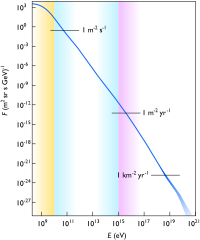
Photo from wikipedia
PURPOSE To develop a plastic scintillation detector (PSD) capable of accurately measuring dose around a low-dose-rate (LDR) iodine-125 (125I) radioactive seed as a first step toward in vivo dosimetry for… Click to show full abstract
PURPOSE To develop a plastic scintillation detector (PSD) capable of accurately measuring dose around a low-dose-rate (LDR) iodine-125 (125I) radioactive seed as a first step toward in vivo dosimetry for prostate LDR brachytherapy. METHODS Using a GEANT4 based Monte Carlo code, photon energy distribution at any position around a realistic 125I source model was obtained. This energy distribution was convolved with the expected energy response from a plastic scintillator and dosimetry accuracy was evaluated. A PSD was constructed and validated in a water phantom for the entire range of clinically relevant positions around an 125I radioactive seed. RESULTS The effect of energy dependence on dosimetry accuracy was shown to be limited, with a maximum relative difference of 1.2% from the calibration condition. A sophisticated approach to account for the energy dependence of PSDs is, therefore, not required if the detector is calibrated using the same model of radioactive seed or a geometrically similar one. The measurements were in good agreement with theoretical models for the entire clinical range. CONCLUSIONS This study shows that PSDs can be used for accurate dosimetry in real time around a single 125I seed used in LDR prostate brachytherapy and is promising for clinical applications.
Journal Title: Brachytherapy
Year Published: 2017
Link to full text (if available)
Share on Social Media: Sign Up to like & get
recommendations!